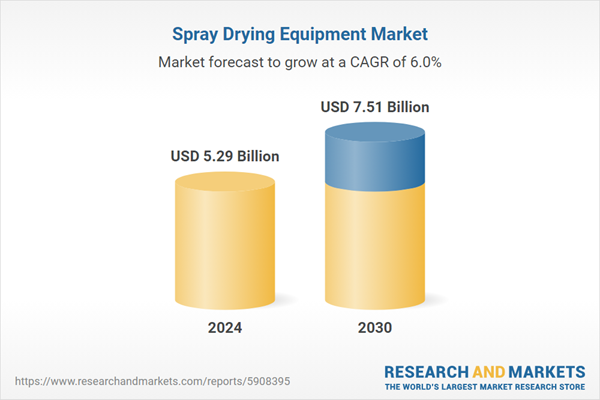Speak directly to the analyst to clarify any post sales queries you may have.
10% Free customizationThis report comes with 10% free customization, enabling you to add data that meets your specific business needs.
This process involves the precise spraying of the liquid into a hot drying medium, commonly air, which prompts rapid evaporation and results in the formation of dry particles. The equipment's value lies in its exceptional efficiency, its ability to preserve the quality of heat-sensitive products, and its remarkable capability to produce particles with controlled size and moisture content. Its widespread application and reliability make it an indispensable tool in various manufacturing processes.
Driving the growth of the spray drying equipment market is the rising demand for processed and convenience foods, particularly in emerging economies. The food industry leverages spray drying technology for producing ingredients like milk powder, coffee, egg powder, flavorings, and nutritional supplements. As consumer preferences shift toward long shelf-life products with consistent quality, manufacturers are increasingly adopting spray drying systems for their precision and scalability. Additionally, the equipment enables the encapsulation of sensitive compounds such as probiotics, flavors, and vitamins, enhancing product stability and delivery, which is vital for maintaining nutritional and sensory attributes in modern food formulations.
Moreover, the pharmaceutical sector is significantly contributing to the adoption of spray drying equipment due to its utility in enhancing the solubility and bioavailability of poorly soluble drugs. The ability to produce fine, uniform particles with desired morphology makes spray drying ideal for drug delivery applications, particularly in the development of inhalable medications and controlled-release formulations. The growing investment in drug R&D, coupled with advancements in spray drying technology such as closed-loop systems and advanced atomization methods is expanding its application in biologics, vaccines, and novel therapeutics. These innovations are driving efficiency, reducing material wastage, and supporting regulatory compliance in pharmaceutical manufacturing.
Key Market Drivers
Technological Advancements in Spray Drying Equipment
Recent technological advancements are playing a key role in accelerating global demand for spray drying equipment. Innovations such as high-speed rotary atomizers, fluidized bed dryers, and enhanced nozzle atomizers are significantly improving product uniformity, drying speed, and energy efficiency. These systems now offer better control over particle size, moisture content, and powder flowability. According to a 2023 industry report, over 60% of global food and dairy processing facilities have upgraded to automated or semi-automated spray drying systems demonstrating the growing preference for advanced machinery capable of meeting rising quality and efficiency standards.Automation and precision control are further driving adoption across industries. The integration of smart sensors, PLCs (Programmable Logic Controllers), and IoT-based monitoring systems enables real-time adjustments and predictive maintenance, reducing operational downtime. Industry 4.0 continues to influence manufacturing practices, and a 2024 global manufacturing survey found that 47% of companies across food and pharma sectors plan to digitize their drying systems in the next two years. This push toward smart manufacturing enhances product traceability, boosts throughput, and aligns with modern quality assurance protocols, making advanced spray drying systems a vital component of contemporary production facilities.
Sustainability is also a major force behind the innovation in spray drying equipment. Manufacturers are increasingly designing systems with improved heat recovery, lower energy consumption, and minimal environmental impact. For example, energy-efficient spray dryers now consume up to 30% less energy than conventional models, contributing to reduced carbon emissions. As global industries face stricter environmental regulations, such technologies are becoming essential. These advancements are helping companies meet their sustainability targets while maintaining cost-effective and high-quality production.
Beyond food and pharmaceuticals, sectors such as chemicals, ceramics, and nutraceuticals are expanding their use of spray drying technology. In these applications, consistent particle formation, scalability, and the ability to handle heat-sensitive compounds are crucial. The growing trend of personalized medicine and high-value formulations further boosts the need for precision drying systems. As industries diversify and product complexity increases, technologically advanced spray dryers offer the flexibility and performance needed to meet evolving demands - positioning them as indispensable assets in modern manufacturing ecosystems.
Key Market Challenges
High Initial Investment & Maintenance Costs
High initial investment and maintenance costs are key factors expected to decrease the demand for Spray Drying Equipment on a global scale. Spray drying is a sophisticated process used across various industries, from food and pharmaceuticals to chemical sectors. Although the technique offers substantial benefits such as improved product quality and efficiency, the significant capital required for initial investment presents a substantial obstacle for many potential users.The high-end spray drying equipment involves advanced technologies, necessitating a hefty upfront cost that may be prohibitive for small and medium-sized enterprises. Furthermore, the expenses associated with the continual maintenance and potential replacement parts of these machines are substantial, adding to the overall operational costs. These factors, together with the economic uncertainty in many parts of the world, result in a reluctance among potential users to invest in spray drying equipment. This trend is expected to decrease the global demand for such equipment, especially in resource-constrained settings and developing markets.
Key Market Trends
Expansion of Dairy Sector in Developing Countries
The dairy sector in developing countries is rapidly expanding owing to growing consumer demand for dairy products, which in turn, is expected to significantly boost the global demand for spray drying equipment. Spray drying is a prominent method used in the dairy industry for the conversion of milk into dry powder form, ensuring longer shelf life and ease of transportation. This technology offers advantages such as moisture removal, thermal efficiency, and product quality preservation, which are essential for the dairy sector.As developing countries continue to industrialize their dairy production to cater to the rising local and global demand, the need for efficient, scalable, and quality-preserving drying methods is paramount. Hence, the adoption of spray drying equipment is projected to surge. The burgeoning middle class in these countries, coupled with dietary shifts towards protein-rich foods, is further fueling the expansion of the dairy sector. Moreover, the push towards modernization of traditional farming practices and enhancement of dairy processing infrastructure is also propelling this trend. Therefore, the combination of these factors creates a substantial demand for spray drying equipment globally, strengthening its market growth. A testament to the interconnectedness of industries, the growth of one sector can indeed stimulate the evolution and expansion of another.
Key Market Players
- GEA Group AG
- Dedert Corporation
- SPX Flow Technology Denmark A/S
- Acmefil Engineering Systems Pvt. Ltd.
- Buchi Labortechnik AG
- European Spraydry Technologies Llp
- Changzhou Lemar Drying Engineering Co. Ltd.
- Shandong Shungeng Drying Equipment Co. Ltd.
- C.E. Rogers Company
- Saka Engineering Systems Private Ltd.
Report Scope:
In this report, the Global Spray Drying Equipment Market has been segmented into the following categories, in addition to the industry trends which have also been detailed below:Spray Drying Equipment Market, By Type:
- Nozzle Atomizer
- Closed Loop
- Rotary Atomizer
- Fluidized
- Centrifugal
- Others
Spray Drying Equipment Market, By Drying Stage:
- Single Stage
- Multistage
Spray Drying Equipment Market, By Flow Type:
- Counter-Current Flow Spray Dryers
- Co-Current Flow Spray Dryers
- Mixed Flow Spray Dryers
Spray Drying Equipment Market, By Application:
- Pharmaceuticals
- Food
- Chemical Industry
- Others
Spray Drying Equipment Market, By Region:
- North America
- United States
- Canada
- Mexico
- Europe
- France
- United Kingdom
- Italy
- Germany
- Spain
- Asia-Pacific
- China
- India
- Japan
- Australia
- South Korea
- South America
- Brazil
- Argentina
- Colombia
- Middle East & Africa
- South Africa
- Saudi Arabia
- UAE
Competitive Landscape
Company Profiles: Detailed analysis of the major companies present in the Global Spray Drying Equipment Market.Available Customizations:
With the given market data, the publisher offers customizations according to a company's specific needs. The following customization options are available for the report.Company Information
- Detailed analysis and profiling of additional market players (up to five).
This product will be delivered within 1-3 business days.
Table of Contents
Companies Mentioned
The leading companies profiled in this Spray Drying Equipment market report include:- GEA Group AG
- Dedert Corporation
- SPX Flow Technology Denmark A/S
- Acmefil Engineering Systems Pvt. Ltd.
- Buchi Labortechnik AG
- European Spraydry Technologies Llp
- Changzhou Lemar Drying Engineering Co. Ltd.
- Shandong Shungeng Drying Equipment Co. Ltd.
- C.E. Rogers Company
- Saka Engineering Systems Private Ltd.
Table Information
| Report Attribute | Details |
|---|---|
| No. of Pages | 180 |
| Published | September 2025 |
| Forecast Period | 2024 - 2030 |
| Estimated Market Value ( USD | $ 5.29 Billion |
| Forecasted Market Value ( USD | $ 7.51 Billion |
| Compound Annual Growth Rate | 5.9% |
| Regions Covered | Global |
| No. of Companies Mentioned | 11 |









